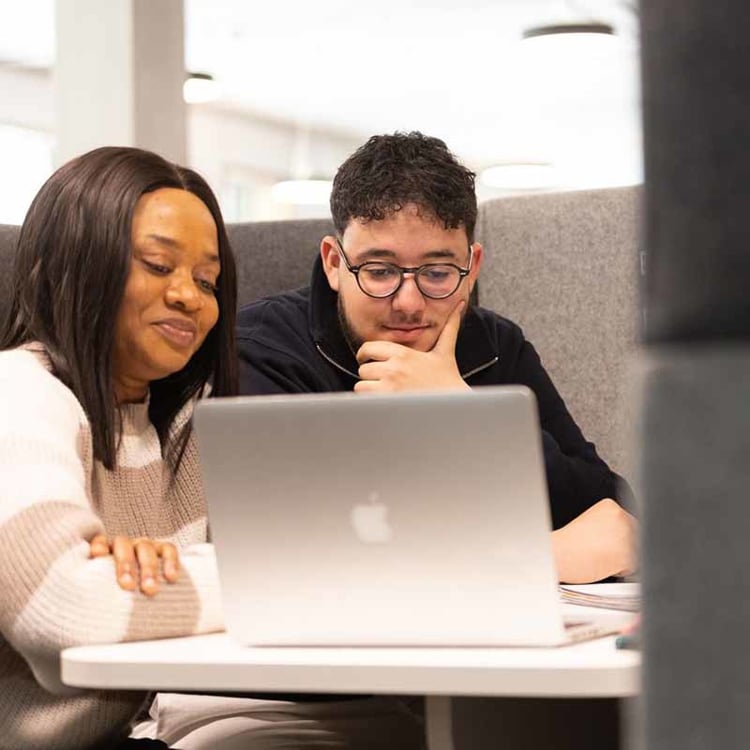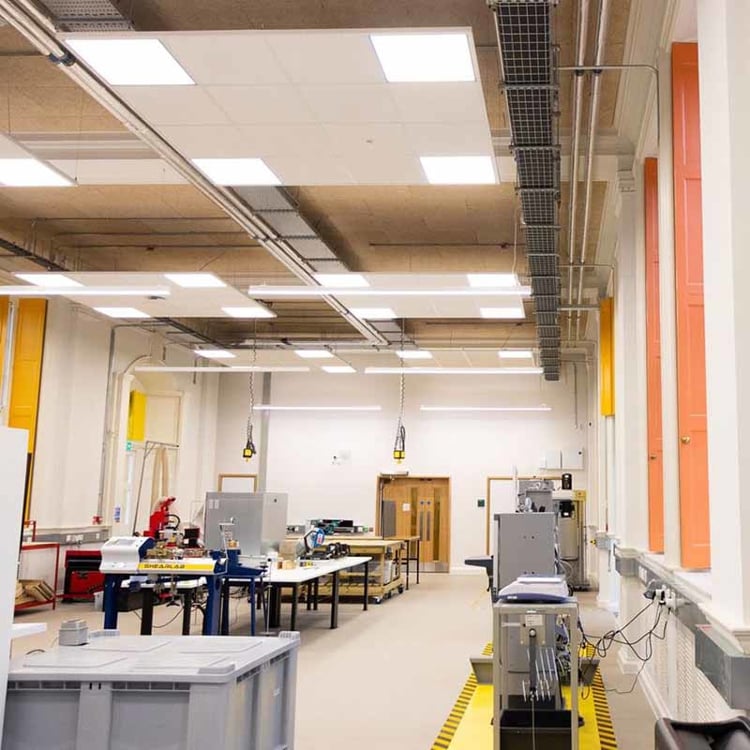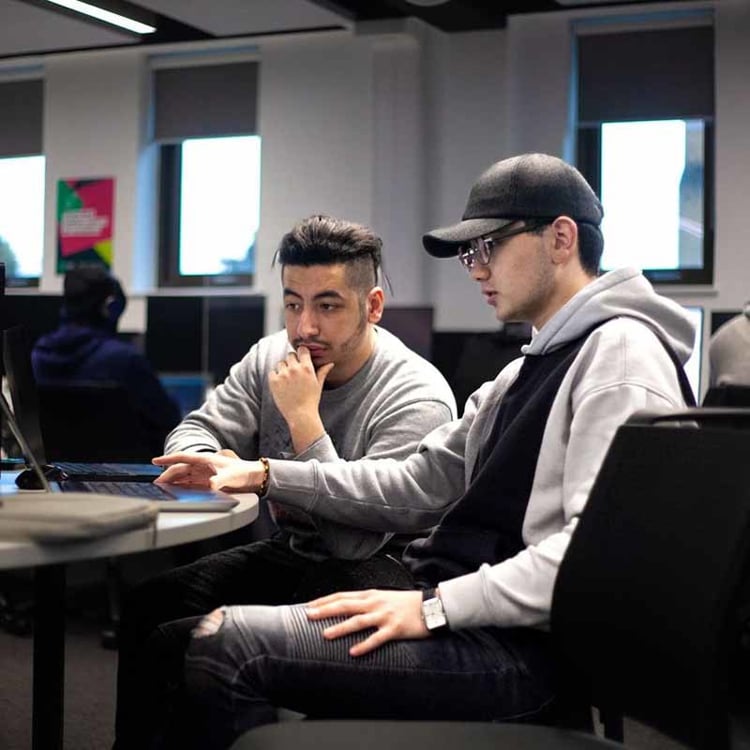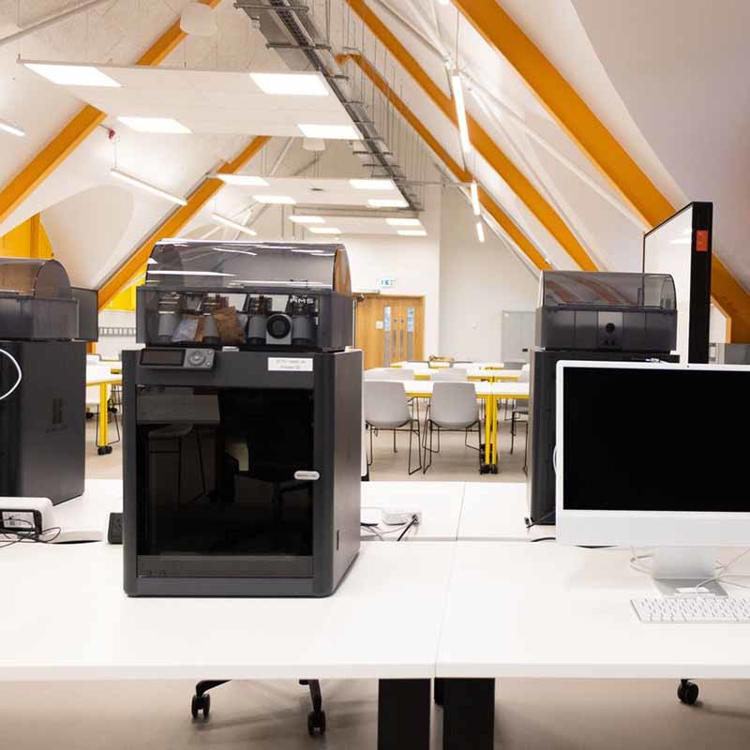Entry tariff:
112–128 UCAS points (or equivalent)
Foundation Year: 64–80 UCAS points (or equivalent)
International Foundation Pathway:
64 UCAS (or equivalent)
IELTS: 5.5
UCAS code:
I611
I612 (if choosing Foundation Year)
Start date(s):
September 2026
From code to launch, get ready to step into the world of professional game development.
You’ll learn:
- C++
- C#
- AI programming
- Physics simulation
- Game design and simulation.
Get ready to master the tools used throughout the industry, and develop your own game portfolio to kick-start your career.
Top 3 in London for student satisfaction
(Complete University Guide 2026)

Succeed in the creative, technically demanding filed of computer games programming.
Your course is aligned with industry standards and professional game development practices, so you develop comprehensive technical skills in game development, programming, and interactive systems.
- Core programming skills – learn fundamental coding concepts, advanced programming techniques, and system architecture. Access widely used industry tools (e.g., C++, Python, game engines, version control systems) so you can design and implement robust game solutions.
- Mathematical and systems understanding – including graphics calculations, physics simulation, and algorithm design, as well as computer systems architecture, processors, and graphics hardware, to optimise game performance across different platforms.
- Game design and prototyping – get hands-on experience in game design principles, prototyping methodologies, storytelling techniques, and character development.
- Advanced graphics and AI programming – build your expertise in computer graphics programming, visual effects systems, and artificial intelligence implementation for games, emphasising efficient rendering techniques, intelligent NPC behaviour, and procedural content generation within professional development frameworks.
- Database and architecture management – advance your technical skills in database design for player data management, software architecture for scalable game systems, and data structure implementation to handle complex multiplayer environments and large-scale gaming applications.
- Professional development practices – experience industry-standard development methodologies, including team collaboration, project management, performance optimisation, and code quality standards essential for working effectively in professional game development studios.
- Technical problem solving – develop critical skills in debugging, algorithm implementation, and technical solution development using industry-standard approaches, performance analysis, and systematic problem-solving frameworks specific to game development challenges.
Modules
30 credits
Software development and programming form the foundation of all Computer Science studies, from web development to artificial intelligence. This module introduces you to the main concepts of computational thinking and their translation into the fundamentals of programming.
You will learn to create pseudocode and Python programs while exploring how programming languages provide essential resources such as documentation, libraries, integrated development environments (IDEs), and debugging tools.
The emphasis will be on core programming principles rather than language-specific details; however, Python will be the primary language for class examples, laboratory exercises, and coursework submissions. Python has been chosen for its popularity with employers, widespread use, and its syntax being particularly suitable for novice learners. The module is designed to future-proof your skills and provide a solid foundation in programming for the remainder of your studies.
In addition to technical skills, the module supports you in developing key academic and professional competencies for computing, including finding, evaluating, and using technical information, becoming resourceful, and building resilience as an independent problem-solver. You will also be introduced to the use and integration of artificial intelligence and AI-based tools in programming.
Teaching and learning
Lecturer-led sessions that deliver the key knowledge-based learning outcomes through explanations, live coding demonstrations, worked examples, and individual practice activities.
Hands-on laboratory practice in which you will apply the knowledge areas and develop practical programming skills through guided exercises and problem-solving tasks.
You'll also have 30 minutes of online learning to help you prepare for classes and revision. Material includes video tutorials, code walkthroughs, and interactive presentations.
Assessment
This module will be assessed by a computational problem-solving portfolio (60%) and a live programming challenge with code review (40%).
30 credits
This module covers the fundamental concepts required to create interactive 3D graphics applications.
This module covers the mathematical principles for computer graphics, game physics, and artificial intelligence, as well as the core principles of how a computer can be used to create and manipulate data to represent a 3D scene. The module explores concepts ranging from simple geometry (e.g., triangle) rendering, to complex scene building using multiple graphics objects, lighting effects, and post-processing.
This module teaches the core principles of representing 3D objects within computer data, working from vectors and matrices, and incorporating texture and lighting data.
Teaching and learning
The module employs a problem-centric pedagogical approach, introducing mathematical concepts and methods through practical programming exercises and applied problem-solving. This approach explicitly connects learning activities to assessment criteria, enabling you to recognise and apply your developing mathematical knowledge in computing contexts.
The module is delivered through two distinct sets of activities:
- Lecturer-led sessions that deliver the key knowledge-based learning outcomes through explanations, live coding demonstrations, worked examples, and individual practice activities
- Hands-on laboratory practice in which you will apply the knowledge areas and develop practical programming skills through guided exercises and problem-solving tasks
Assessment
This module will be assessed by coursework (50%) and an in-class test (50%).
30 credits
This module builds on the foundation delivered in Software Development by examining the challenges faced when programming a real-time interactive game application.
The module focuses on developing your C++ programming skills, working on object-orientation, template programming, and effective design patterns to support C++ programming. You will succeed in modules that rely on core C++ skills – particularly Computer Graphics, Games Prototyping (1, 2, and 3), and Games Engineering.
The aim of this module is to capstone the software development theme for games programmers by widening your perception of C++ programming approaches and paradigms. At the end of the module, you should have enough experience and exposure to C++ programming and frameworks so you can utilise the language effectively in games-based projects.
Teaching and learning
The module is delivered through two distinct sets of activities:
- Lecturer-led sessions that deliver the key knowledge-based learning outcomes through explanations, live coding demonstrations, worked examples, and individual practice activities.
- Hands-on laboratory practice in which students apply the knowledge areas and develop practical programming skills through guided exercises and problem-solving tasks.
Assessment
This module will be assessed by coursework (50%) and an in-class test (50%).
30 credits
This module allows you to work with students from different programmes to collaborate on a project using your diverse skills.
You will work within a team of other students from Computer Games Programming, Games Design, and Games Art to prototype a game-based project.
The module will focus on using industry standard tools, such as Unity or Unreal Engine, so that you can quickly prototype a game. The aim is to introduce you to collaborative cross-disciplinary working practices that are essential when working within the games industry. The module will also support you with core employability skills in team working and cross-disciplinary working.
Teaching and learning
You will work in small group learning environments, such as seminars and workshops.
You will also have six hours of online learning.
Assessment
This module will be assessed by a portfolio (70%) and a game design document (30%).
These are the current planned modules on this course and may be subject to change.
30 credits
This module explores the principles and practices of artificial intelligence (AI) in digital games, focusing on techniques that create engaging, adaptive, and believable gameplay.
You will study both classical AI methods and modern approaches tailored to interactive environments. Topics include pathfinding and navigation, decision-making systems, behaviour modelling, procedural content generation, and adaptive difficulty.
The course emphasises practical implementation: you will build AI agents and integrate them into small game prototypes, learning how to balance technical efficiency with the design goals of fun, fairness, and immersion.
Teaching and learning
The module is delivered through two distinct sets of activities:
- Lecturer-led sessions that deliver the key knowledge-based learning outcomes through explanations, live coding demonstrations, worked examples, and individual practice activities
- Hands-on laboratory practice in which you will apply the knowledge areas and develop practical programming skills through guided exercises and problem-solving tasks.
Assessment
This module will be assessed using a Portfolio 1, Prey/Predator Animation System (50%) Portfolio 2, RPG game demo (50%).
30 credits
This module brings together the elements of the BSc Computer Games Programming degree by having you construct a game engine from the elements of your previous work.
You will then use the developed game engine to create a game, demonstrating your ability to undertake significant software engineering work, as well as delivering a significant piece of portfolio work. You will work as a team to show your ability to work collaboratively on technical deliverables.
The aim of this module is to develop your confidence in building large-scale software systems (a game engine) in collaboration with a team of other technical students. Building significant software systems is an important skill not only in games development but in software engineering as a whole.
Teaching and learning
The module is delivered through two distinct sets of activities:
- Lecturer-led sessions that deliver the key knowledge-based learning outcomes through explanations, live coding demonstrations, worked examples, and individual practice activities
- Hands-on laboratory practice in which you will apply the knowledge areas and develop practical programming skills through guided exercises and problem-solving tasks.
Assessment
This module will be assessed by a game engine design (70%) and coursework (30%).
In this module, you will collaborate with students from other programmes on a project using your diverse skills. This module extends upon the Game Prototyping (1) module by allowing you to integrate skills you have further developed in your degree of study, such as Computer Graphics, Asset Creation, etc.
You will work with a diverse team of other students from Computer Games Programming, Games Design, and Games Art to prototype a game-based project. The module will focus on industry-standard tools – such as Unity or Unreal Engine – so that you can develop a more substantial game project that should be a fully playable implementation of a small game, level, or similar.
The aim of the module is to allow you to collaborate in a cross-disciplinary team, further developing cross-disciplinary working practices that are essential when working in the games industry. Furthermore, you will be able to develop part of your portfolio by demonstrating how your skills are used in a larger project.
30 credits
This professional practice-focused module gives you the opportunity to use and enhance your programming skills while experiencing how complex software projects are developed and managed in industry.
In this module, you will work in a group throughout the term to create a full-stack web application using industry-standard Agile development methodology and modern project management techniques.
You will use industry-standard tools to create designs, establish shared development environments, design a database, develop, share, test code, and finally deploy and run your applications. In this experience of the entire software development lifecycle, you will need to combine and develop your full range of technical, professional, and teamwork skills.
Each week's class is divided into individual and group work sessions.
In your individual work, you will be introduced to a new skill or technique to develop. These will include introductions to commonly used frontend and backend development frameworks, as well as ‘devOps’ and testing technologies, for example Docker and GitHub Actions, Jest unit testing and Nightwatch browser automation.
In the group session, you will review your weekly tasks and goals and hold a supportive 'standup' meeting with your lecturer to ensure the project progresses efficiently and with equal participation. You may be allocated a specialist role in your group (for example, Project Manager, Frontend Developer, DevOps Engineer, Quality Assurance specialist), but you will also build skills and experience across all these areas.
You will be expected to communicate with your group between the weekly sessions to ensure that planned work is undertaken within the required timeframe.
Groups are encouraged to create a project that serves social and environmental purposes. This requires you to explore user needs, ethical and professional issues, and security. You will establish Personal Learning Journey (PLJ) goals at the beginning of the module and maintain a PLJ journal throughout. This will prepare you for your third year and enable you to start focusing on specialist areas for your Final Year project. A professional Agile coach will conduct a masterclass of best practices in project planning and teamwork.
This module will give you ample opportunity to become familiar with industry practice and build your professional portfolio. You will be encouraged to reflect on your experiences and understand how these can support your job applications and interviews.
Teaching and learning
You will gather technical skills in lab sessions, that build on your earlier modules and immediately apply these to the group project via carefully planned weekly tasks.
The technical skills are supported by screencasts and lab sheets so that there are easy to use resources available for you to implement the technical features required for their projects.
Assessment
This module will be assessed by a group software development project (70%) and an individual reflective practice and mock interview (30%).
These are the current planned modules on this course and may be subject to change.
This course offers all students the option of a one-year paid work placement, to boost your employability even further. If you choose this route, you will take the placement following year two of your course, and then return to complete your degree.
Why take a placement?
A placement year is the perfect opportunity to gain valuable work experience, to build on the career skills we will teach you on this degree. The connections you make on the placement will improve your career prospects further, and equip you with the skills you need to secure graduate-level employment.
How we support you
The University's Placement and Work Experience Team are experts at helping you to secure a placement. They will work closely with you from the start, helping you research potential employers, discover placement opportunities, create and pitch your CV, and will coach you to perform well in interviews. We aren't able to guarantee a placement, but our sector-leading advisors will give you the best possible chance of securing one.
Find out more about how we'll support you
We understand that your plans might change once you start your programme. If you decide not to do a placement, you will have the option of completing the three year version of your programme.
Whatever your choice, you will have access to many opportunities for work experience through our Placement and Work Experience Team, and access to face-to-face and 24/7 online careers support.
30 credits
The Capstone Project provides you with the essential opportunity to deeply explore a subject of high personal interest, situated within the context of your overall programme of study.
You are expected to apply and synthesise your professional practice and research capabilities throughout this project. By bringing these skills together, you will conduct a substantial investigation that extends and demonstrates your practical and academic knowledge. Upon completion, you will produce a significant technical artifact alongside a detailed report.
Building on the Professional Practice in Technology module, you will be able to critically engage with current literature and established research methodologies. Using the knowledge and feedback gained from this module, you will be equipped to develop your research question or problem statement. This work will lead you to systematically evaluate relevant sources, creating a strong foundation for your investigation.
Implementing knowledge gained from the earlier module will enable you to strengthen your methodological approach and demonstrate advanced research and problem-solving skills in your capstone project. You will be able to design and implement an evidence-based solution that addresses your research question and stated objectives. The project culminates in a critical evaluation and reflection on the impact of your solution in relation to your original research goals.
You will be assigned a named individual supervisor who will provide expert guidance throughout your project. While your supervisor is key, you are strongly encouraged to access the full range of academic and research support systems available across the university to enhance your work.
Collaboration is often a feature of the Capstone Project: you may either work with external stakeholders who provide a real-world project brief, or you may have the chance to work alongside an academic, contributing directly to their ongoing research. This project is not undertaken in isolation; peer support is fundamental, and your Capstone Project is developed within a strong, supportive learning community of both staff and fellow students.
Teaching and learning
The module is delivered via three modes of study:
- On-campus sessions that help you conform to the necessary timeline and project requirements
- One-to-one feedback from a named supervisor
- Independent study
The on-campus sessions provide practical activities which directly contribute to the students’ project deliverables.
Peer support via on-campus session activities and group supervisory meetings is strongly encouraged and rewarded via digital badges in Moodle.
Assessment
This module will be assessed by a feedback-feedforward and Q&A session (30%) and a report and artefact (70%).
30 credits
This module is a hands-on introduction to designing and building multiplayer games, with a strong focus on practical implementation.
You will learn the core principles of real-time and turn-based networking, player synchronisation, authoritative servers, matchmaking, and lag compensation. Emphasis is placed on industry-standard tools and workflows to help you build scalable and engaging multiplayer experiences.
Through a series of projects, you will prototype multiplayer features such as lobby systems, chat, cooperative gameplay, and competitive modes inside a modern game engine.
By the end of the module, you will have the skills to design, develop, and deploy functional multiplayer game prototypes that reflect professional practices.
Teaching and learning
The module is delivered through two distinct sets of activities:
- Lecturer-led sessions that deliver the key knowledge-based learning outcomes through explanations, live coding demonstrations, worked examples, and individual practice activities
- Hands-on laboratory practice in which you will apply the knowledge areas and develop practical programming skills through guided exercises and problem-solving tasks.
Assessment
This module will be assessed by game design (30%) and coursework (70%).
30 credits
This module is designed to develop the professional skills and mindset needed to succeed in technology-related careers, alongside enhancing your research and academic skills.
Taking key emerging technologies and current professional issues within your chosen pathway as a starting point, you will define and develop your own area for enquiry. You will be supported to systematically find and analyse academic and industry research publications and review existing technical solutions relevant to your area.
You will return to key topics in professional practice, including project lifecycle management, professional frameworks, agile and traditional methodologies, technical communication, ethical and legal considerations with deeper understanding, and apply these to your own project. You’ll also engage with global perspectives and inclusive practices relevant to your discipline.
Teaching and learning
Your learning will be active and applied. In class, you’ll participate in seminars, lab-based workshops, and project supervision sessions. Outside the classroom, you’ll conduct independent research, collaborate with peers, and use industry-standard tools such as Git, Trello, and JIRA to manage your work.
Each week includes a four-hour teaching session, structured as:
- Interactive keynote discussion - introducing key concepts, frameworks, and professional contexts.
- Guided workshop activities - hands-on practice with tools, methods, and scenarios; individual and collaborative problem-solving.
You will begin to engage with outside stakeholders relevant to your project and apply your knowledge and skills in user research and requirements gathering.
Assessment
This module will be assessed through coursework, where you will prepare a literature review on a chosen topic (50%) and poster project proposal with a Q&A session (50%).
30 credits
This module allows you to work with students from different programmes to collaborate on a project using your diverse skills.
The module extends upon the Game Protoyping 2 module and concludes the collaborate stream. You will integrate the skills you've developed from other modules.
You will work within a diverse team of other students from Computer Games Programming, Games Design, and Games Art to build a professional standard game project. This will form a key part of your portfolio of work. The module will provide an environment for you to work collaboratively but will encourage autonomy and self-direction in how to deliver the product.
The aim is to introduce you to collaborative cross-disciplinary working practices that are essential when working within the games industry. You will be able to develop part of your portfolio by demonstrating how your skills are used in larger projects.
Teaching and learning
You will work in small group learning environments, such as seminars and workshops.
You will also have six hours of online learning.
Assessment
This module will be assessed by a portfolio (70%) and a game design document (30%).
These are the current planned modules on this course and may be subject to change.
This course offers a foundation year, which takes place at the beginning of your studies. Studying a foundation year will give you academic and practical experience, and a strong introduction to your subject, ensuring you succeed on your undergraduate degree.
30 credits
You will develop your core academic and integrated English language skills of speaking, listening, reading and writing. You will become familiar with key academic skills and concepts, such as referencing methods and awareness of academic integrity and tone. You will apply these skills and knowledge to both broad topics and also your chosen subject pathway.
Teaching and learning
You will be required to actively engage in on-campus learning for up to 10 hours a week.
You will be taught through a full range of teaching and learning methods, which include lectures, seminars, workshops, discussion groups, group directed tasks and presentations. This will enable you to learn from your peers and tutors in both structured and information settings.
You will be encouraged to think creatively about your approach to learning and discussions with your peers. You will also have access to recordings, resources, links and signposting through Moodle to enrich your learning.
Assessment
You will be assessed through group and individual presentations, comparative and reflective essays, multiple choice exams, coursework and reports, oral exams, portfolios, case studies and blogs.
30 credits
You will develop your core academic and integrated English language skills of speaking, listening, reading and writing. You will become familiar with key academic skills and concepts, such as referencing methods and awareness of academic integrity and tone. You will apply these skills and knowledge to both broad topics and also your chosen subject pathway.
Teaching and Learning
You will be required to actively engage in on-campus learning for up to 10 hours a week.
You will be taught through a full range of teaching and learning methods, which include lectures, seminars, workshops, discussion groups, group directed tasks and presentations. This will enable you to learn from your peers and tutors in both structured and information settings.
You will be encouraged to think creatively about your approach to learning and discussions with your peers. You will also have access to recordings, resources, links and signposting through Moodle to enrich your learning.
Assessment
You will be assessed through group and individual presentations, comparative and reflective essays, multiple choice exams, coursework and reports, oral exams, portfolios, case studies and blogs.
30 credits
You will develop your research, numeracy and information technology skills. You will investigate the difference between primary and secondary research, conduct your own research project and demonstrate your findings through data analysis. You will also develop your awareness of equality, diversion and inclusion in the UK, through a real-world issue; discrimination in the workplace.
Teaching and learning
You will be required to actively engage in on-campus learning for up to 10 hours a week.
You will be taught through a full range of teaching and learning methods, which include lectures, seminars, workshops, discussion groups, group directed tasks and presentations. This will enable you to learn from your peers and tutors in both structured and information settings.
You will be encouraged to think creatively about your approach to learning and discussions with your peers. You will also have access to recordings, resources, links and signposting through Moodle to enrich your learning.
Assessment
You will be assessed through group and individual presentations, comparative and reflective essays, multiple choice exams, coursework and reports, oral exams, portfolios, case studies and blogs.
30 credits
You will be taught about how the use of computing software impacts the environment from day-to-day activity through use of business and everyday jobs. This is through the excessive use of computing software as well as the changing way that society operates. You will be encouraged to engage in debates and discussions regarding energy consumption in the use of computing software, in terms of the amount of use as well as the type of materials utilised. You will be encouraged to look at responsible innovation and software impact and the long-term effects this may have.
You will look at how the increased use of IT and computing has contributed to the significant development of globalisation in the interconnectivity and internationalisation of the job market. Discussions on how globalisation has contributed to the international development of education, technology development and the emerging market economies through operating systems and internet operations. This is also linked to their assignment in the international platform of Linked In in developing their e-portfolio.
Teaching and learning
The teaching delivery for each module consists of one, one-three-hour lecture and one, two-hour lab session each week with pair and group work.
There will also be a 30-minute weekly virtual task and multiple-choice quizzes.
Assessment
This module will be assessed using a multiple-choice test and online portfolio.
40% - multiple choice test, which will take place online during a class.
60% - online portfolio, in this written task you will create a blog post, which reports on an individual data research and processing project. You will also create a LinkedIn profile and subject weekly learning journal entries.
30 credits
This module focuses on how to solve problems via program development. The module initially builds your understanding of logic, before teaching you how to develop algorithms. The latter half of the module focuses on programming using a Visual Programming Language (VPL) such as Android App Inventor or Google’s Blockly. The module ends with a discussion on the limits of computation, including data representation and physical limitations.
You will be taught about how the use of computing software impacts the environment from day-to-day activity through use of business and everyday jobs. This is through the excessive use of computing software as well as the changing way that society operates. You will be encouraged to engage in debates and discussions regarding energy consumption in the use of computing software, in terms of amount of use as well as type of materials utilised. You will look at responsible innovation and software impact and the long-term effects this may have.
The module explores how advancements in computing and IT have accelerated globalisation by enhancing interconnectivity, transforming industries, and expanding access to information. You will examine the role of computational thinking and problem-solving in a global context, including the impact of software development, and automation on international markets. Discussions will focus on how programming and algorithm design contribute to technological advancements, remote collaboration, and the evolving global job market. Additionally, you will be able to engage with international computing standards and digital platforms, such as LinkedIn, to develop your profile and understand the significance of global networking in the technology sector.
Teaching and learning
The teaching delivery for each module consists of one, one-three-hour lecture and one, two-hour lab session each week with pair and group work.
There will also be a 30-minute weekly virtual task and multiple-choice quizzes.
Assessment
This module will be assessed using programming coursework and a class test.
60% - coursework, you will design a simple algorithm to solve a problem using flowcharts and pseudocode.
40% - class test, you will construct a program to solve using a Visual Programming Language.
These are the current planned modules on this course and may be subject to change.
Career
Designed to address market demands, you'll graduate ready for a career in the games industry.
Your future role could be:
- Game programmer
- Gameplay developer
- Graphics programmer
- AI programmer
- Game engine developer
- Technical artist

The Student Futures team is here to support you throughout your time at Roehampton and beyond.
They offer services tailored to your needs, helping you take confident steps towards your future.
You’ll have access to a wide range of career workshops and events, where you can engage with employers and develop the skills you need to succeed in the workplace.
These opportunities will help you build your CV, prepare for interviews, and connect with successful Roehampton graduates who are thriving in their careers. You’ll also be able to engage with our partners across London and beyond.
Wherever you want to go in the future, you'll be preparing for the world of work from your very first day.
Learning and assessment
Choose a course built around active, hands-on learning.
You’ll work both independently and with your fellow students to tackle real briefs - developing the technical, creative, and professional skills demanded by the games industry.
We believe that the best way to learn is by doing, and we support that with inclusive teaching, personalised lab sessions, and a learning environment that’s as engaging as the games you’ll create.
From interactive, game-style activities to project-based assessments, every aspect of your learning is designed to build your confidence, deepen your expertise, and allow you to graduate industry-ready.
How you’ll learn
You’ll get practical experience from day one, learning in active seminars. Our approach is hands-on, immersive, and reflective of industry workflows.
Your time at university will consist of:
- Dynamic workshops
- Team projects where you respond to real industry challenges
- Technical lab sessions in our state-of-the-art facilities, with the dedicated support of our teaching teams, so you supported to learn at your own pace
- Leaning to use industry-standard software
- Access to flexible learning resources, where materials like videos, online resources and quizzes ahead of time so you can learn at your own pace.
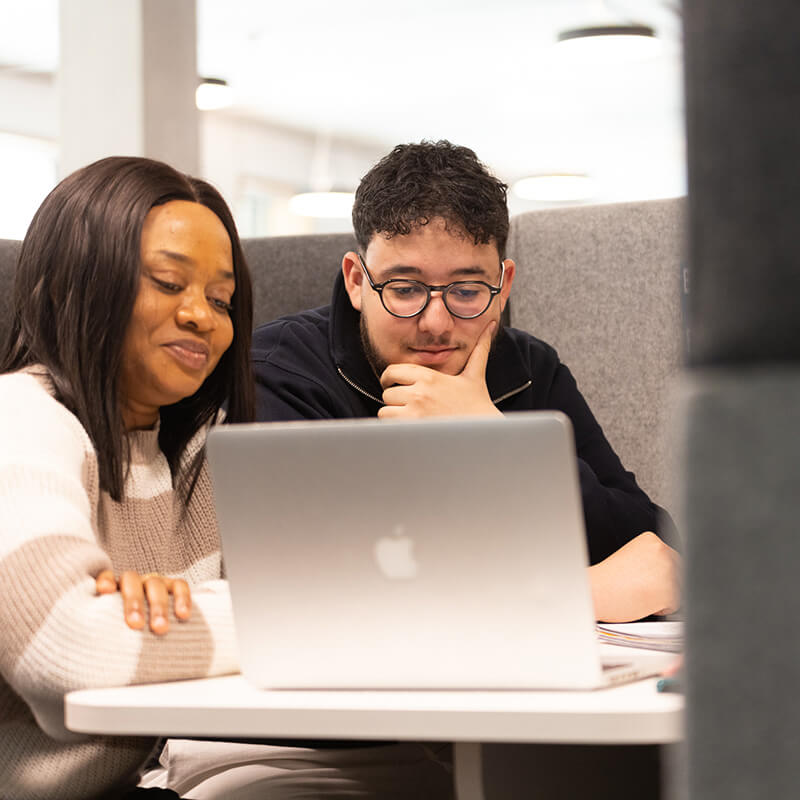
How you’ll be assessed
Your assessments mirror the tasks expected of professional programmers, to ensure you graduate with proven skills.
This includes:
- Practical assignments
- Lab-based course work
- Analysis and structured reports
- Scenario-driven coursework
- Interactive, gamified assessments
- Group-projects
- Your final year, capstone project.

Cutting-edge facilities in the Sir David Bell building
We offer six dedicated computing labs on campus, each equipped with specialised facilities, including a dedicated cyber security lab.
All the software necessary for your studies is freely available, allowing you to work conveniently from anywhere and at any time using your personal device.
Open days
Get a real taste of our campus, community and what it’s like to study at Roehampton
Applying
Full-time UK undergraduate students apply through UCAS.
Entry tariff
112–128 UCAS points (or equivalent)
Foundation Year: 64–80 UCAS points (or equivalent)
Looking to work out your UCAS points or find out about our entry requirements? Find out more.
When we consider applications to study with us, we form a complete view of your achievements to date, and future potential, and can offer flexibility in entry requirements. Find out more about our Contextual Offer scheme.
We welcome applicants with a wide range of qualifications, including BTECs, A-levels and T Levels.
Specific entry requirements
Entry to this course normally requires a Mathematics, Computer Science, or another science/technology based subject at A Level (or equivalent).
General entry requirements
International undergraduate students apply through our direct application system.
Entry tariff
112–128 UCAS points (or equivalent)
International Foundation Pathway:
64 UCAS (or equivalent)
IELTS: 5.5
Looking to work out your UCAS points or find out about our entry requirements? Find out more.
When we consider applications to study with us, we form a complete view of your achievements to date, and future potential, and can offer flexibility in entry requirements. Find out more about our Contextual Offer scheme.
General entry requirements
Fees and funding
UK students
Tuition fees
| Entry date | Undergraduate Year 1 | Undergraduate Foundation Year |
|---|---|---|
| September 2026 | £9,790 | £9,790 |
Prices shown are for the first year of your degree.
Funding your studies
We also provide other ways to support the cost of living, including on-campus car parking, hardship support and some of the most affordable student accommodation and catering in London.
International students
Tuition fees
| Entry date | Undergraduate Year 1 | Undergraduate Foundation Year | International Foundation Pathway |
|---|---|---|---|
| September 2026 | £17,628 | £17,628 | £17,628 |
| January 2027 | – | – | £17,628 |
Prices shown are for the first year of your degree.
Funding your studies
We also provide other ways to support the cost of living, including on-campus car parking, hardship support and some of the most affordable student accommodation and catering in London.



